SECURITY Where from does the term security come?

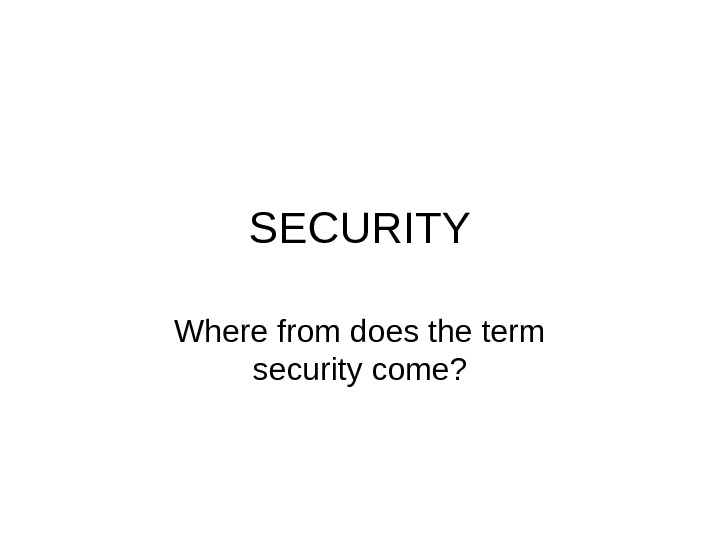
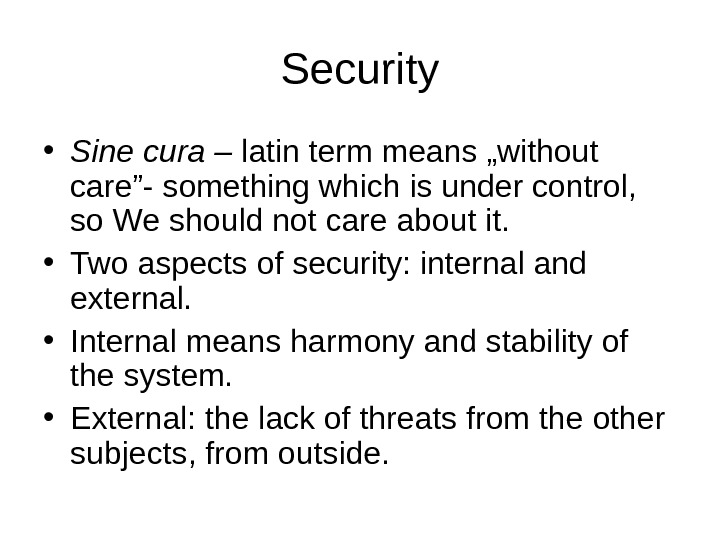
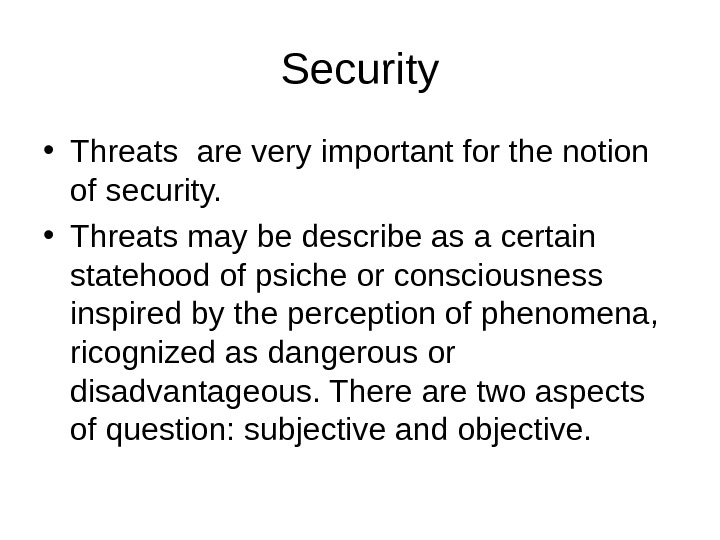
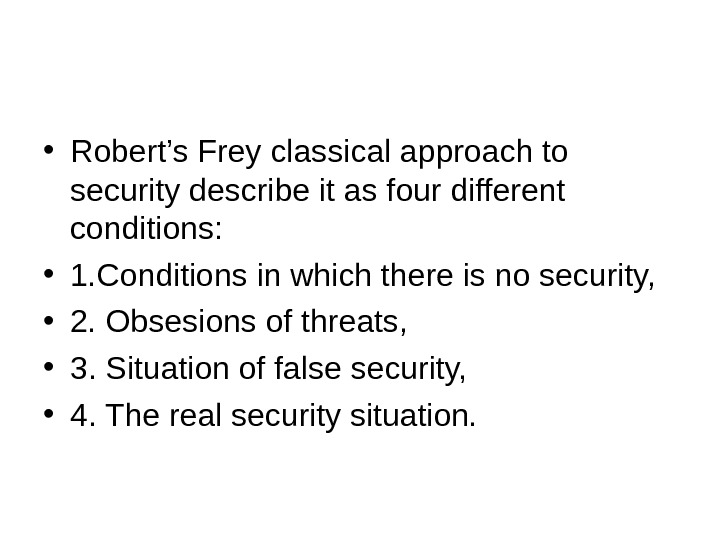
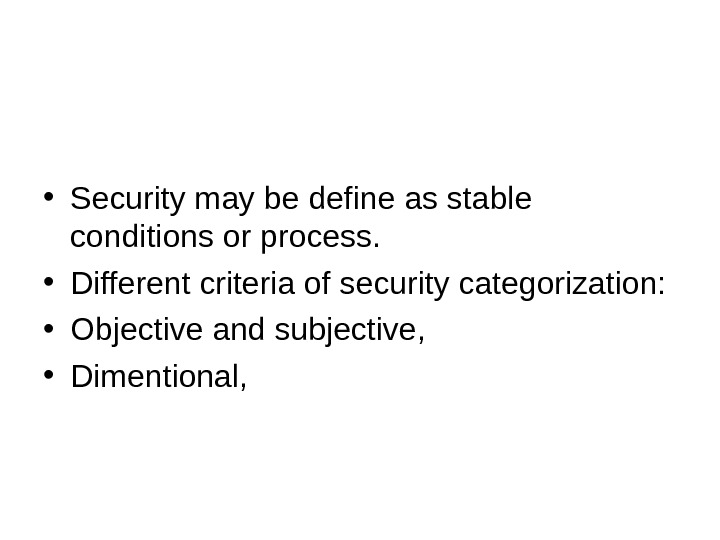
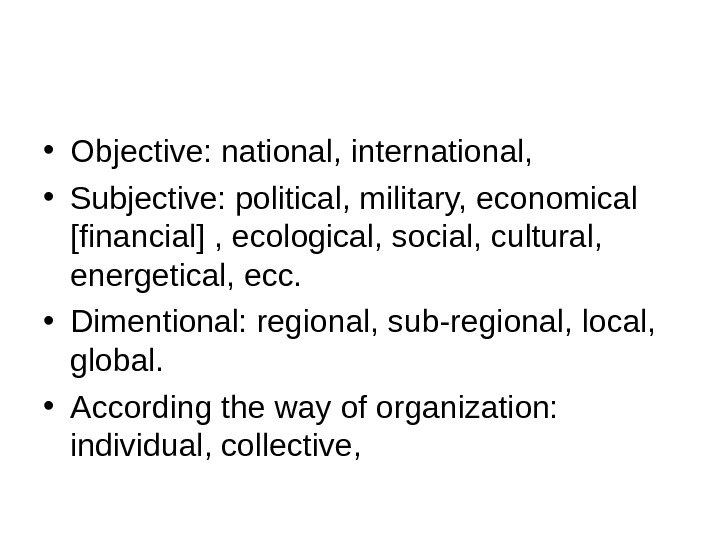
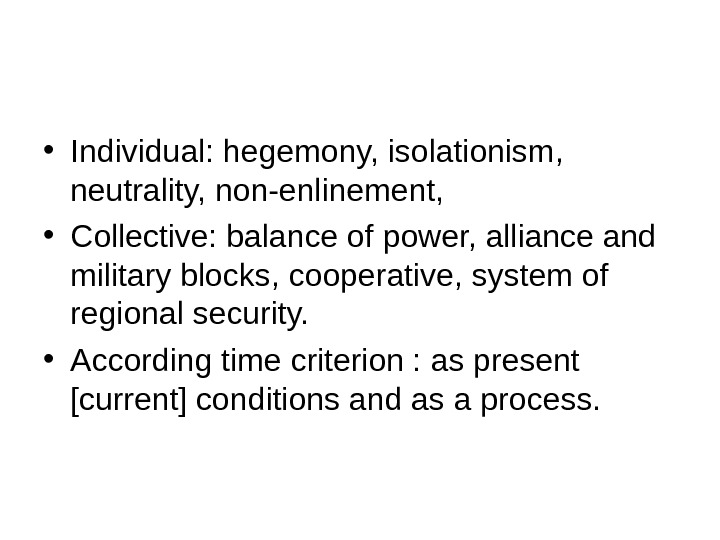
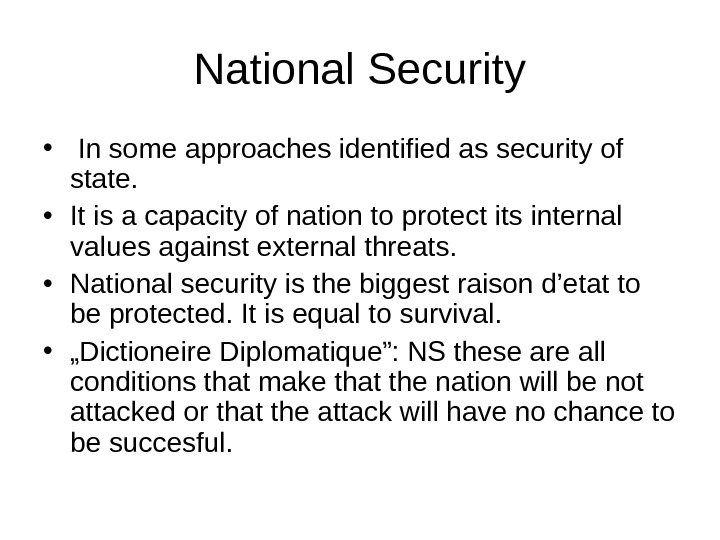
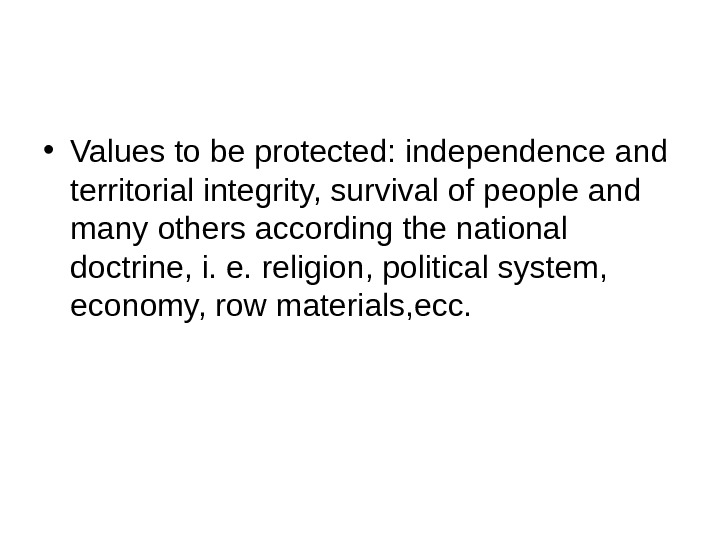
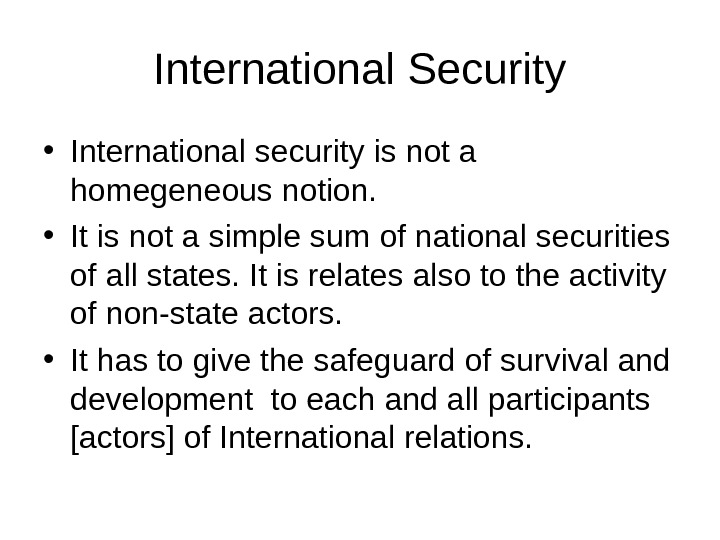
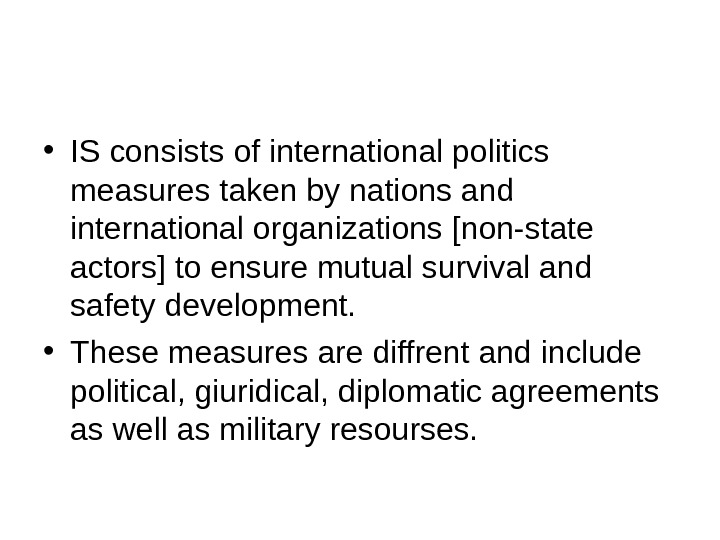
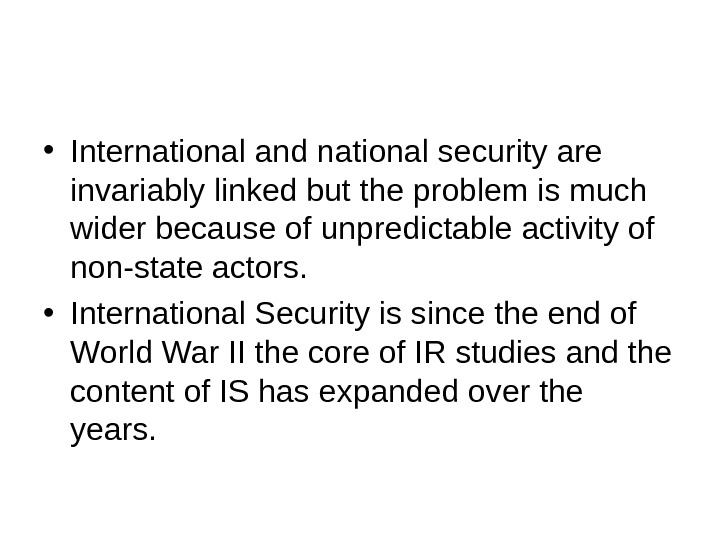
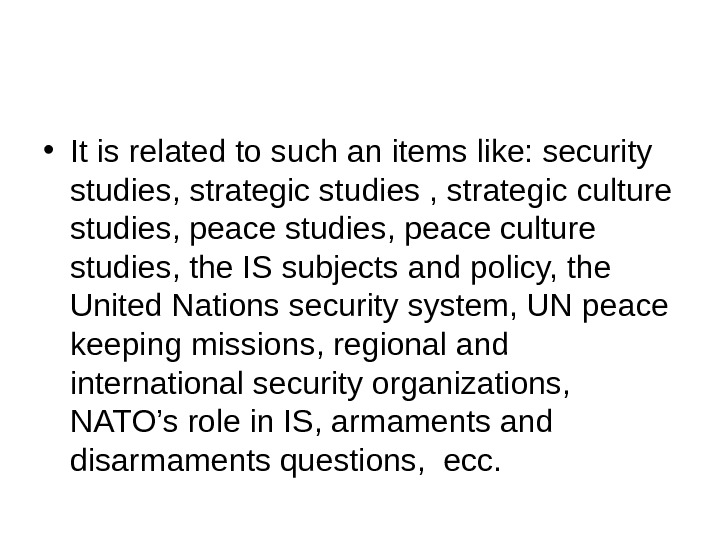
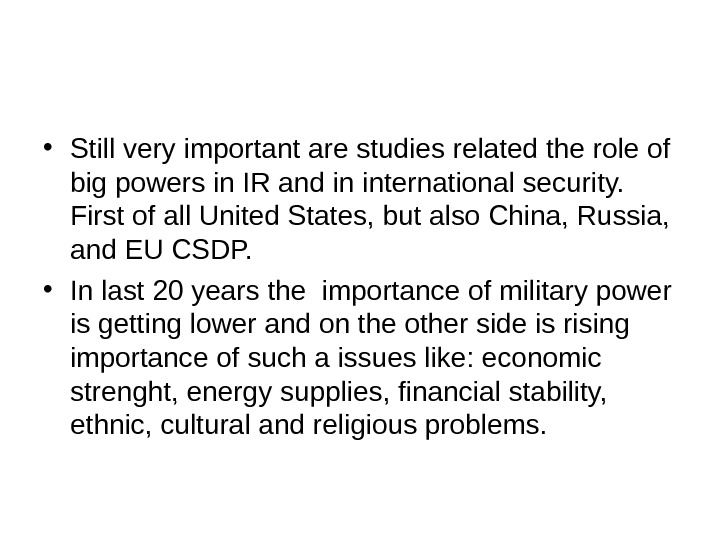
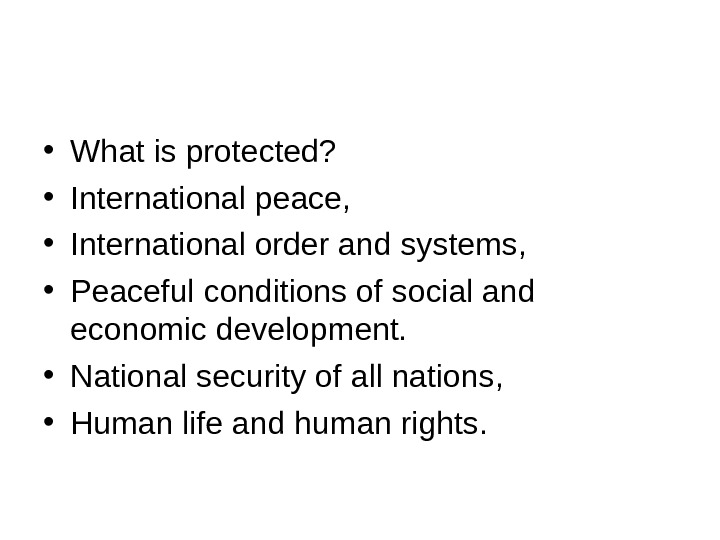
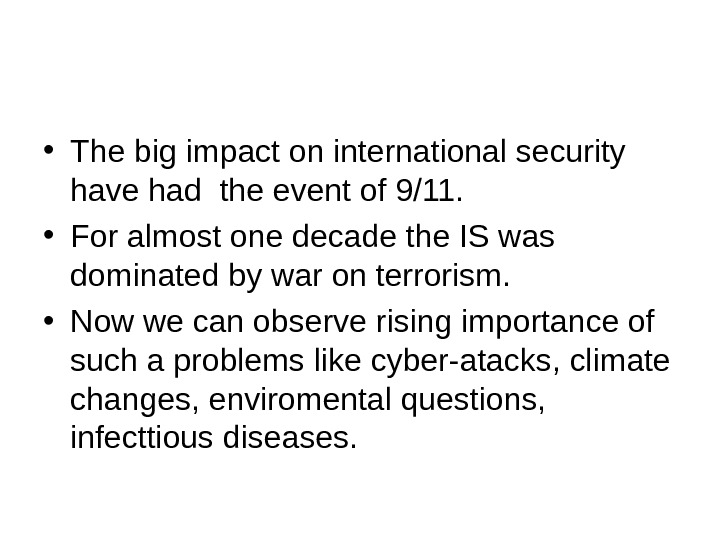
- Размер: 45 Кб
- Количество слайдов: 16
Описание презентации SECURITY Where from does the term security come? по слайдам
 SECURITY Where from does the term security come?
SECURITY Where from does the term security come?
 Security • Sine cura – latin term means „without care”- something which is under control, so We should not care about it. • Two aspects of security: internal and external. • Internal means harmony and stability of the system. • External: the lack of threats from the other subjects, from outside.
Security • Sine cura – latin term means „without care”- something which is under control, so We should not care about it. • Two aspects of security: internal and external. • Internal means harmony and stability of the system. • External: the lack of threats from the other subjects, from outside.
 Security • Threats are very important for the notion of security. • Threats may be describe as a certain statehood of psiche or consciousness inspired by the perception of phenomena, ricognized as dangerous or disadvantageous. There are two aspects of question: subjective and objective.
Security • Threats are very important for the notion of security. • Threats may be describe as a certain statehood of psiche or consciousness inspired by the perception of phenomena, ricognized as dangerous or disadvantageous. There are two aspects of question: subjective and objective.
 • Robert’s Frey classical approach to security describe it as four different conditions: • 1. Conditions in which there is no security, • 2. Obsesions of threats, • 3. Situation of false security, • 4. The real security situation.
• Robert’s Frey classical approach to security describe it as four different conditions: • 1. Conditions in which there is no security, • 2. Obsesions of threats, • 3. Situation of false security, • 4. The real security situation.
 • Security may be define as stable conditions or process. • Different criteria of security categorization: • Objective and subjective, • Dimentional,
• Security may be define as stable conditions or process. • Different criteria of security categorization: • Objective and subjective, • Dimentional,
![• Objective: national, international, • Subjective: political, military, economical [financial] , ecological, social, cultural, • Objective: national, international, • Subjective: political, military, economical [financial] , ecological, social, cultural,](/docs//security_images/security_5.jpg) • Objective: national, international, • Subjective: political, military, economical [financial] , ecological, social, cultural, energetical, ecc. • Dimentional: regional, sub-regional, local, global. • According the way of organization: individual, collective,
• Objective: national, international, • Subjective: political, military, economical [financial] , ecological, social, cultural, energetical, ecc. • Dimentional: regional, sub-regional, local, global. • According the way of organization: individual, collective,
 • Individual: hegemony, isolationism, neutrality, non-enlinement, • Collective: balance of power, alliance and military blocks, cooperative, system of regional security. • According time criterion : as present [current] conditions and as a process.
• Individual: hegemony, isolationism, neutrality, non-enlinement, • Collective: balance of power, alliance and military blocks, cooperative, system of regional security. • According time criterion : as present [current] conditions and as a process.
 National Security • In some approaches identified as security of state. • It is a capacity of nation to protect its internal values against external threats. • National security is the biggest raison d’etat to be protected. It is equal to survival. • „ Dictioneire Diplomatique”: NS these are all conditions that make that the nation will be not attacked or that the attack will have no chance to be succesful.
National Security • In some approaches identified as security of state. • It is a capacity of nation to protect its internal values against external threats. • National security is the biggest raison d’etat to be protected. It is equal to survival. • „ Dictioneire Diplomatique”: NS these are all conditions that make that the nation will be not attacked or that the attack will have no chance to be succesful.
 • Values to be protected: independence and territorial integrity, survival of people and many others according the national doctrine, i. e. religion, political system, economy, row materials, ecc.
• Values to be protected: independence and territorial integrity, survival of people and many others according the national doctrine, i. e. religion, political system, economy, row materials, ecc.
 International Security • International security is not a homegeneous notion. • It is not a simple sum of national securities of all states. It is relates also to the activity of non-state actors. • It has to give the safeguard of survival and development to each and all participants [actors] of International relations.
International Security • International security is not a homegeneous notion. • It is not a simple sum of national securities of all states. It is relates also to the activity of non-state actors. • It has to give the safeguard of survival and development to each and all participants [actors] of International relations.
![• IS consists of international politics measures taken by nations and international organizations [non-state actors] • IS consists of international politics measures taken by nations and international organizations [non-state actors]](/docs//security_images/security_10.jpg) • IS consists of international politics measures taken by nations and international organizations [non-state actors] to ensure mutual survival and safety development. • These measures are diffrent and include political, giuridical, diplomatic agreements as well as military resourses.
• IS consists of international politics measures taken by nations and international organizations [non-state actors] to ensure mutual survival and safety development. • These measures are diffrent and include political, giuridical, diplomatic agreements as well as military resourses.
 • International and national security are invariably linked but the problem is much wider because of unpredictable activity of non-state actors. • International Security is since the end of World War II the core of IR studies and the content of IS has expanded over the years.
• International and national security are invariably linked but the problem is much wider because of unpredictable activity of non-state actors. • International Security is since the end of World War II the core of IR studies and the content of IS has expanded over the years.
 • It is related to such an items like: security studies, strategic studies , strategic culture studies, peace culture studies, the IS subjects and policy, the United Nations security system, UN peace keeping missions, regional and international security organizations, NATO’s role in IS, armaments and disarmaments questions, ecc.
• It is related to such an items like: security studies, strategic studies , strategic culture studies, peace culture studies, the IS subjects and policy, the United Nations security system, UN peace keeping missions, regional and international security organizations, NATO’s role in IS, armaments and disarmaments questions, ecc.
 • Still very important are studies related the role of big powers in IR and in international security. First of all United States, but also China, Russia, and EU CSDP. • In last 20 years the importance of military power is getting lower and on the other side is rising importance of such a issues like: economic strenght, energy supplies, financial stability, ethnic, cultural and religious problems.
• Still very important are studies related the role of big powers in IR and in international security. First of all United States, but also China, Russia, and EU CSDP. • In last 20 years the importance of military power is getting lower and on the other side is rising importance of such a issues like: economic strenght, energy supplies, financial stability, ethnic, cultural and religious problems.
 • What is protected? • International peace, • International order and systems, • Peaceful conditions of social and economic development. • National security of all nations, • Human life and human rights.
• What is protected? • International peace, • International order and systems, • Peaceful conditions of social and economic development. • National security of all nations, • Human life and human rights.
 • The big impact on international security have had the event of 9/11. • For almost one decade the IS was dominated by war on terrorism. • Now we can observe rising importance of such a problems like cyber-atacks, climate changes, enviromental questions, infecttious diseases.
• The big impact on international security have had the event of 9/11. • For almost one decade the IS was dominated by war on terrorism. • Now we can observe rising importance of such a problems like cyber-atacks, climate changes, enviromental questions, infecttious diseases.

